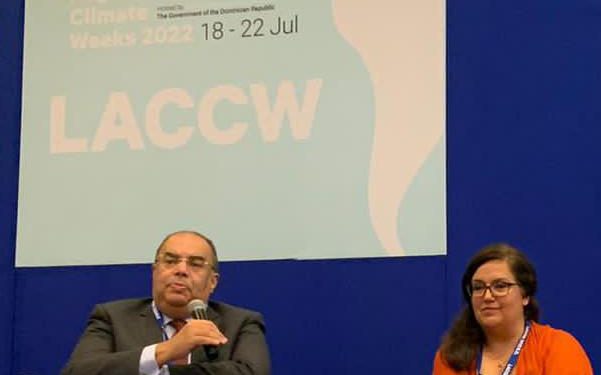Dr Mahmoud Mohieldin, UN Climate Change High Level Champion for Egypt, said that recent studies and data proved that investing in climate change adaptation and resilience will lead to lower risks, reduces economic losses, enhances resources and people productivity and therefore, boost incomes.
His remarks came during his participation on Wednesday in the activities of Latin America and Caribbean Climate Week (LACCW) hosted by Dominican Republic on 18-22 July.
Mohieldin added that in a 2.0°C warming scenario by 2050, about 800 million additional people could be living in urban areas under severe water stress compared with today, meanwhile, investing $250–500 per hectare in better dryland farming practices could increase cereal yields by 70–140% bringing net economic benefits of billions of dollars.
He referred to the big role that businesses can play in adaptation, to benefit both themselves and the wider communities which they engage with, he also mentioned that with the ability to catalyse public and private funds, the multilateral development banks have an opportunity to successfully attract and deploy climate financing to support low-carbon resilient growth in developing countries and emerging economies.
The climate champion said that Race to Resilience campaign is a convening platform of NSAs to help accelerate action and successfully implement climate projects through local solutions that suit every community separately.
Mohieldin stressed that implementation of adaptation and resilience will be critical at COP27, saying that Race to Resilience campaign has a Business Engagement workstream designed to facilitate how the business sector can join the race, he added also that COP27 will be used as a platform to engage more businesses in the Race.
“COP27 aims to put resilience on an equal footing with mitigation, plug the finance gap as less than 6% of all climate finance tracked globally can be attributed to adaptation, recognise the power of nature-based solutions, and empower society, because everyone has a role to play, from cultural organisations to businesses across all sectors.” Mohieldin said.
In a related context, Dr Mahmoud Mohieldin clarified that agreeing a new goal on climate finance post 2020 is critical to maintain trust among parties, adding that to preserve this trust, developed countries, at least must fulfill the Copenhagen conference commitment to the $100 billions.
He said that the new goal needs to ensure a holistic approach keeping a balance between mitigation and adaptation, facilitating an effective just transition in line with the development priorities for the countries.
He confirmed the persistent need to shift trillions towards a resilient net zero economy, saying that recent reports show that reaching net-zero by 2050 requires to shift over $125 trillions in investments, while another report shows funding required by developing countries for adaptation purposes could range from $140-300 billion per year by 2030; and $280-500 billion per year by 2050.
“This is an investment that will pay back! The Global Commission on Adaption finds that investing $1.8 trillion in resilience from 2020 to 2030 could generate $7.1 trillion in total net benefits.” He said.
On another side, Dr Mohieldin expressed that castal communities in LAC are at high risks due to sea level rise and increased extreme weather events.
He stressed the importance of supporting islands to achieve their climate goals, increase their resilience, and attain equitable outcomes of transitioning to green economy.



